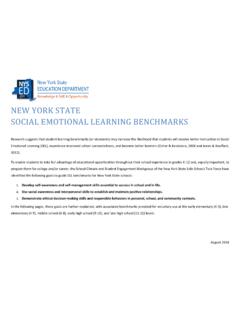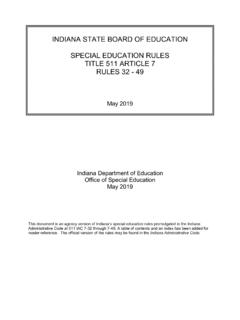Transcription of The Oracy Benchmarks - Voice 21
1 The Oracy Benchmarks Voice 21.. Voice 21. Acknowledgements We would like to thank the following people for generously sharing their experiences, insights and time to help to shape this report: Ed Booth Helen Bruckdorfer Alice Kennedy Sir John Holman Megan Hubbard Phillip Hughes Paul Johnson Dr Christine Mclean Channelle Owen Jeremy Pentreath Foziya Reddy Amelia Smith Stuart Wright Voice 21 is a national charity that exists to enable teachers and schools to provide a high quality Oracy education so that all young people can find their Voice for success in school and life. Voice 21 We achieve this by delivering teacher development and school improvement programmes, promoting the impact of Oracy on student outcomes and building a movement for change.
2 To find out more about our work, visit: 1. Foreword Voice 21 started delivering Oracy who understand that Oracy is not a programmes in 2016 and since then programme to be completed one we have worked with thousands of year and gone the next, or an extra- teachers and hundreds of schools, curricular endeavour for a select few, supporting them to develop Oracy but rather an essential facet of an both at a classroom and whole- effective, empowering and expan- school level. From large urban sive education. secondaries to small rural prima- ries, from Plymouth to Dundee, no As with many important things in two schools have been the same. education, there is no one single Uniting these teachers and schools, right' way to provide a high quality however, is the belief that their Oracy education.
3 Recognising the students need, and are entitled to, diversity and complexity of schools an education in Oracy . and classrooms across the UK, we have sought to create Benchmarks Oracy is complex, too often both that schools and teachers can meet everywhere and nowhere within a in a myriad ways, consistent with school. With scant coverage in the their different approaches. Through national curriculum, a lack of focus identifying and exemplifying the on Oracy in teacher development active ingredients that make a high and without national standards or quality Oracy education, we hope to qualifications to work towards, it is both motivate and guide educators often overlooked. With an increasing towards ensuring Oracy becomes a recognition of its importance, teach- typical part of every student's ers and school leaders we have education.
4 Worked with have sought to under- stand how they can best enable As more teachers and schools take every child to benefit from an Oracy up this challenge, we hope that education. What does excellent the Oracy Benchmarks will be built classroom practice look like? What upon, refined and developed further. is the role of a school leader? How Whether just starting out, or already do we know if Oracy is making a on your Oracy journey, we invite you difference? It was this need to clarify, to join this conversation. distil and share what makes a high quality Oracy education that prompt- Let's get talking in class! ed the development of the Oracy Benchmarks . Amy Gaunt and Alice Stott The Benchmarks show what teachers and school leaders must do: teaching Oracy explicitly and nurturing it continually, weaving it into their curriculum and all aspects of school life to ensure its efficacy and status.
5 They reflect the ambitions and actions of educators 2. The importance of a high quality Oracy education Oracy is the ability to articulate ideas, develop understanding and engage with others through spoken language. In school, Oracy is a powerful tool for learning ; by teaching students to become more effective speakers and listeners we empower them to better understand themselves, each other and the world around them. Through a high quality Oracy education students learn through talk and to talk. This is when they develop and deepen their subject knowledge and understanding through talk in the classroom, which has been planned, designed, modelled, scaf- folded and structured to enable them to learn the skills needed to talk effectively.
6 O. R learning learning to A through talk talk C. Y. The deliberate, explicit and systematic teaching of Oracy across phases and through- out the curriculum will support children and young people to make progress in the four strands of Oracy outlined in the Oracy Framework. Cognitive Content - Choice of content to convey meaning &. intention - Building on the views of others social & emotional Structure Working with others - Structure & organisation of talk - Guiding or managing interactions Linguistic - Turn-taking Clarifying & summarising Physical Vocabulary - Seeking information & clarification Listening & responding through questioning - Listening actively & responding - Appropriate vocabulary choice - Summarising appropriately Voice - Pace of speech Language Self-regulation Confidence in speaking - Tonal variation - Maintaining focus on task - Clarity of pronunciation - Register - Time management - Self assurance - Voice projection - Grammar - Liveliness & flair Reasoning Body language Rhetorical
7 Techniques Audience awareness - Giving reasons to support views - Gesture & posture - Rhetorical techniques such as metaphor, - Critically examining ideas & views - Taking account of level of understand of - Facial expression & eye contact humour, irony & mimicry expressed the audience The Oracy Framework was developed in partnership with Oracy Cambridge. 3. These skills are crucial to children and young people's success in school and in their life beyond. It is therefore vital that all schools believe that an education in Oracy is the responsibility of every teacher and the entitlement of every child. Promotes social The impact equity of a high Narrows gaps quality Oracy Equips students education to thrive in life beyond school Fosters wellbeing Improves academic outcomes Increases confidence You are the only second chance for some children to have a rich language experience.
8 If these children are not getting it at school, they are not getting it.. Neil Mercer, Emeritus Professor of Education at the University of Cambridge & Director, Oracy Cambridge Since 2015, Voice 21 has been working to make this a reality by building the capacity of schools and teachers across the UK to provide all students with a high quality Oracy education and developing and promoting evidence on the impact and value of Oracy . Find out more about our work and how you can get involved 4. The Oracy Benchmarks The vast majority of teachers (68%) and headteachers (84%) believe that Oracy is important for their students. This is borne out in the research evidence about Oracy , which demonstrates its importance for success in school, and in life beyond.
9 However, knowing that Oracy is an essential skill, alongside literacy and numeracy, is not enough. Just as with literacy and numeracy, the key skills and knowledge for Oracy to be taught must be defined. The Oracy Framework, devised by Voice 21 and Cambridge University, does this, outlining the skills needed to be an effective speaker and listener. But how does this translate into practice? What does it mean for the teachers in classrooms up and down the country? How can a school ensure every student leaves them a confident speaker? For other key pillars of education, such as literacy and numeracy, there have been vast swathes of guidance to support teachers and schools to understand how best to teach these essential life skills.
10 But our research shows that teachers and school leaders aren't confident about how to deliver an Oracy education or what good looks like. The Oracy Benchmarks seek to address this, creating shared expectations for Oracy teaching in schools. They reflect how, just as with literacy and numeracy, students'. Oracy cannot be developed through one singular strategy or intervention. Instead, they draw together the layers of school life which Oracy must permeate if every child is to find their Voice . What are the Oracy Benchmarks ? The Oracy Benchmarks outline what constitutes a high quality Oracy education. They provide a robust and realistic framework for teachers and schools to: Understand what makes a high quality Oracy education Articulate clear goals for their own Oracy provision Open up dialogue about their current practice Guide strategic planning and improvement In creating the Oracy Benchmarks , we have drawn upon Voice 21's experience working with hundreds of educators in different settings, phases and roles across the country and have worked in close consultation with teachers and schools.




